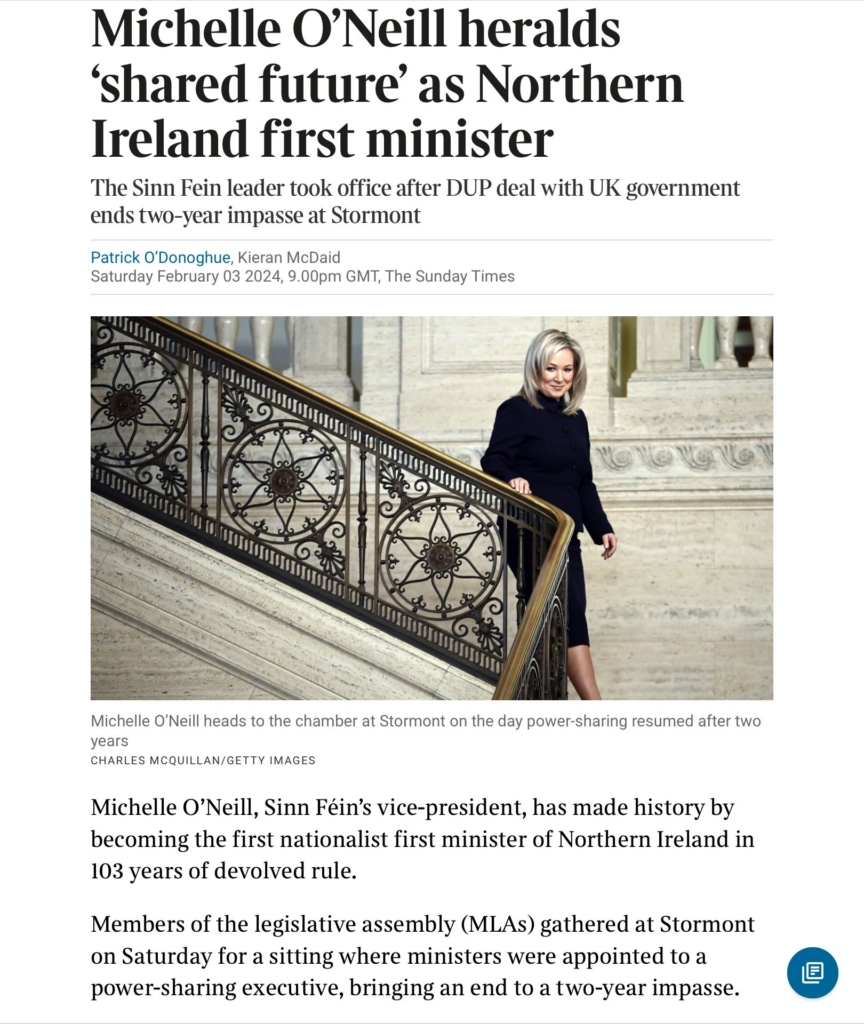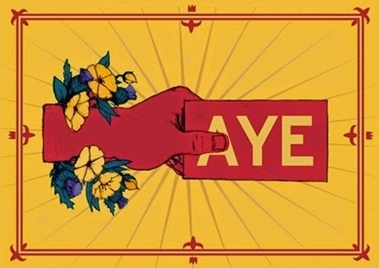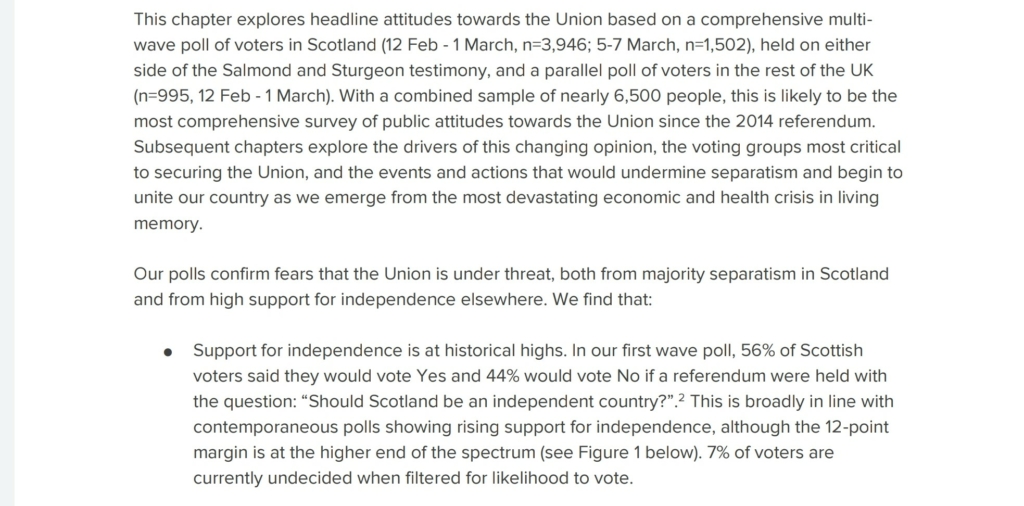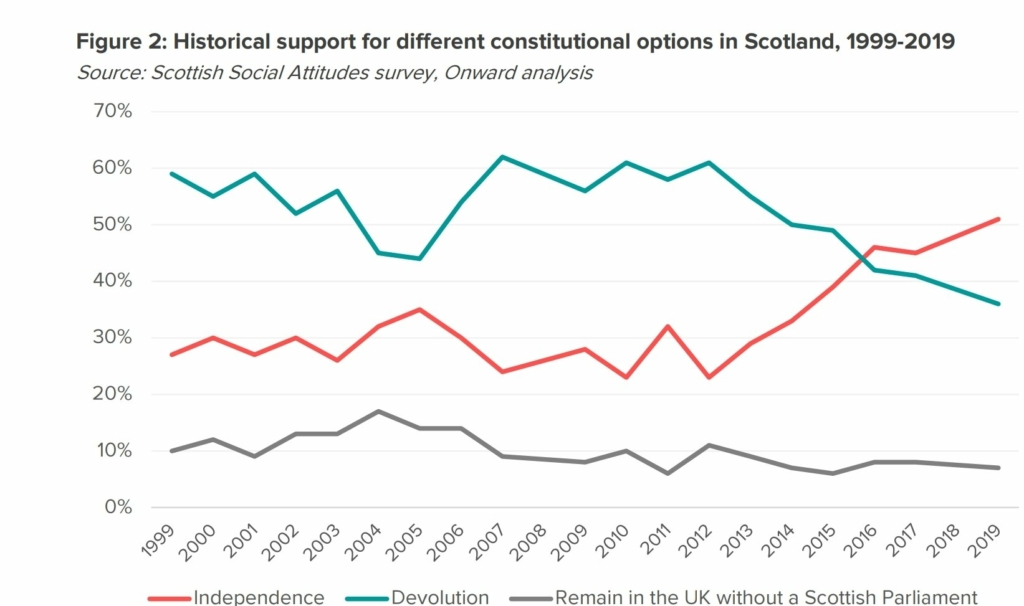Irish Unification and Scottish Independence
It’s with great sadness to read that Keir Starmer has ditched Gordon Brown’s proposed constitutional reforms, though of course we did report this in November of last year (‘Excitable Scribes‘). The Observer reported “NEW: Keir Starmer has ditched his promise to abolish the House of Lords in a first term as he seeks to make the Labour manifesto “bombproof” of Tory attacks.”
Toby Helm and Michael Savage report that: “Labour’s cautious approach – which is frustrating some MPs and party members – is partly the result of uncertainty about the economic situation it will inherit and what can be afforded.” Though there is no explanation how long-promised constitutional reforms would be affected by the ‘economic situation’.`

The announcement must be a disappointment to Scottish Labour’s cheerleaders in the commentariat who have long lauded Gordon Brown’s endless ‘blueprints’ as some secret miracle in the making, proof of Real Labour, the Union and the The Future, all about to be rolled out in a fanfare. They were just sure it would.
Instead, we are facing the reality of Brexit, Panorama reveals that we are now the poorest country in Northern Europe and that the average British person is 60% poorer than the average American. Britain is broken and the incoming Labour government is promising, literally, to do nothing. But it’s not true that Britain is just in stasis. Beneath the impression of being stuck and moribund there are signs of deeper change beneath the surface.
Yesterday Northern Ireland’s devolved government was reconvened and appointed Michelle O’Neill as First Minister in a historic moment for Sinn Féin and Irish nationalism. The County Tyrone republican is the region’s first nationalist first minister – and the first non-unionist executive leader since the partition of Ireland in 1921. She struck a tone that was remarkable in its confidence and equanimity with little mention or reference to constitutional change, which was left to her counterpart Sinn Féin’s leader, Mary Lou McDonald, who said Irish unity was now within “touching distance”.

Of course this isn’t immanent, and there are huge hurdles to it happening, but it is possible in a way that it never has been in your lifetime. Just as Labour promises ‘no change’ change is taking place regardless. Poignantly as Gordon Brown’s proposals are quietly abandoned, some commentators realise this. Panicking in the Guardian Simon Jenkins writes (‘Northern Ireland will leave the union, and Scotland could too. True devolution is the only way to save it‘): “The UK is the only western European state whose unity is unstable, except for possibly Spain. Almost half of Northern Irish voters expect to rejoin the rest of Ireland within 20 years, and nearly 60% of Scots want some form of independence. Even in Wales, independence is favoured by almost a third. In all these cases, younger voters are the most eager for a breakup of the UK. This is hardly a trivial matter.”
In a typically confused ramble Jenkins writes: “In England, devolution is clearly popular among those to whom it applies …People of all ages, but especially the young, crave its enhanced local identity. But the UK’s separate “nations” are a constitutional mess and need reform.”
Note the inverted commas.
He finished: “In Northern Ireland, the only long-term future must lie in reunion with the Republic, eased by a Britain that rejoins the European single market …
“Scotland is a different matter. As the UK in 2016 slid so casually out of the EU, so could Scotland slide out of the UK. It should, by size and economic potential, be as rich and independent as Ireland or Denmark. Ireland shook off its reliance on the UK and became a Celtic Tiger. While it might be a pity – and a sad comment on England – Scotland could do the same. The next British government should start by tearing up the Barnett formula and devolving real power – fiscal power – in Scotland. Otherwise we should welcome the future Denmark of the British Isles.”

It’s a touching confidence from the writer, which few of his colleagues would openly share. His Scottish counterparts are full of despair and self-loathing about their countries future. But there is a chasm between his analysis – that deep constitutional change is required to save the Union – and the reality being spelt out by Keir Starmer.
Now we see the State of the Union report, from the ‘centre-right think-tank Onward. You can read it here. The report charts the rise in support for Scottish independence, in what is ‘likely to be the most comprehensive survey of public attitudes since the 2-14 referendum’. It concludes that:
“Scottish identity is increasingly becoming oppositional to British identity, driving a wedge through the Union in Scotland. This is not the case in other parts of the United Kingdom, where British and national identities co-exist without contest, although Welsh opinion appears to be shifting in the same direction…”
“This appears related to a steep divergence between the liberal values and welcoming political culture that Scots want their nation to embody, and those that they see as intrinsic to the UK, which they see as essentially conservative, values which are not seen as an anathema in other devolved nations.”
“The question for policymakers in the coming years will be how to reconcile these two opposing conceptions, so that citizens of devolved nations see their values as aligned to those of the wider United Kingdom. Given the importance of national identity to voter intention, it is the most important question Unionists have to answer.”


What Onward tells us, and we can see across polling, is that support for self-determination lives on despite the SNP policy failures, relentless attacks on devolution, Labour’s assumed ascendancy, the media Ducking Stool of Sturgeon and the press consensus about the state of Scotland (awful).
The wider picture is that resistance to change, denial of difference, suppression of devolution has not and will not strengthen the Union. As we wrote here (‘Peace Babies, Generation Yes and the End of Britain‘) the demographic shifts we can see across the Irish Sea are mirrored in Scotland and Wales. The reality for those celebrating the demise of the SNP and Labour’s triumph as if it is the sign of a ‘return to default’ Britain should remember that more than two-thirds of under-25s, all of whom were too young to vote in 2014, support independence today.
None of this going away and the likelihood next of Mary Lou McDonald becoming Taoiseach is high. Irish unification will push the disintegration of the United Kingdom and wider Celtic self-determination will be propelled by British intransigence and the complacency of Starmer’s manifesto of nothingness.

The progress towards independence for both Scotland and Northern Ireland could be speeded up if the concept of a federation of Scotland and Ireland within the EU (as advocated Robert Whitford in ‘The Flight of the Gaels’) could gain some traction. As the author says, these constitutional structures would be more aligned with the cultural fault lines currently present in the British Isles.
I’m curious as to why RoI would want to entangle itself with a ‘nation’ such as Scotland. Would they appreciate the 50% or so unionist stalwarts we have in the population, the orange order with it’s ridiculous and hate filled marches and the all pervading sense of ‘we’re a’ doomed’ (a sense heightened by the performance of the SNP governernment in respect of almost everything it touches?). A nation so feart that on the one occasion in modern history when it was free to chart its own course it voted to hand control back to London?
I’m afraid we’ve come a long way from the days when Edward Bruce’s attack on English-ruled Ireland. Would the Bruces have stopped at Ireland and Scotland? Or would Wales have been their next target, in a sort of United Celtic Kingdom?
50% of the population may not currently support independence but they are not all Uber unionists.
The orange order are an annoying but declining relic mainly supported by older generations.
The SNP have made some mistakes but they are operating against tiredness from incumbency, austerity, an increasingly hostile approach from Westminster and a media implacably opposed to independence and organisations that support it.
As for the Private Fraser ‘we’re all doomed mentality’ your comment appears to typify this mentality.
In spite of all of the infighting and failures of SNP and independence movement support for independence is 50% and higher with all demographics apart from >65’s.
I and many others are convinced that if we can raise support to>60% this will be the tipping point at which Westminster cannot resist and some form of independence becomes inevitable.
This will probably appear glass half full to many but one thing is sure a glass half empty approach, which you appear to demonstrate, will not benefit the cause.
So sorry that we have not lived up to your expectations. Perhaps you should find another vehicle for your narcissism.
The attraction for the Republic would be the stabilisation of politics on the island of Ireland.
I’m curious as to why a federation of Scotland and Ireland within the EU ‘would be more aligned with the cultural fault lines currently present in the British Isles’.
The current demography of the British Isles transcends the traditional cultural fault lines of 19th century ethno-nationalist romance. The idea that Scotland and Ireland (and Wales) are ‘Celtic’ nations, set over and against England, a ‘Germanic’ nation, is a racist construction that has long since been exploded. The British Isles are nowadays criss-crossed by myriad interlaced identities that can no longer be geographically corralled into different localities. There is no cultural fault line running from the Tweed to the Solway, down the Irish Sea, and along Offa’s Dyke.
The cultural fault lines referred to by the author do not relate to ethnicity but to issues such as European identity, social responsibility etc, issues which transcend ethnicity. There is majority support for such cultural attitudes in Ireland (north and south) and Scotland but not in England. Wales in complicated in that it shares some cultural attitudes with Ireland and Scotland (eg social responsibility) but not others (eg voted for Brexit).
And yet successive British Social Attitude surveys consistently show that voters in Scotland are only marginally more pro-european and social democratic than voters in England; too marginal to count as a ‘cultural fault line. In fact, social attitudes generally remain remarkably homogenous across the British Isles, which gives thr lie to Scottish exceptionalism.
And yet when votes were counted the electorate of Scotland voted 2:1 to Remain in EU including every region of Scotland.
Polls can be manipulated whereas votes are cast by real people. Social survey polls can be used to prove all sorts of opinions.
Independence for me and many others is primarily about politics and the EU vote is another example where the electorate in Scotland have different political preferences and priorities to other parts of UK.
The UK electorate in England voted 5:4 to leave the EU, not 2:1. More or less the same proportion as the proportion of the Scottish electorate that voted to remain in the UK two years earlier.
And even so, the British Social Attitudes survey for 2016 found that:
only 25.4% of the UK electorate in England and Wales believed that Britain’s long-term policy should be to leave the European Union; 16.5% of the UK electorate in Scotland agreed.
just over 40% of the UK electorate in Scotland believed that we should stay within the EU, compared with 39% in England and Wales.
The great tragedy of the EU referendum was that voters used it to stick two fingers up to the British establishment rather than to endorse or reject the euroscepticism of a rump of the Tory Party.
BTW Do feel free to dismiss the findings of the National Centre for Social Research’s British Social Attitudes surveys if they don’t suit your preferred narrative. Ignore the fact that it’s the largest independent and not-for-profit social research organisation in the UK, has driven innovation in survey methods and methodology over the past 50 years, especially in finding new ways to engage with challenging or under-represented groups. It’s seen internationally as a leader in this field and collects a number of official national and supranational statistics on behalf of the UK and national governments. Its annual British Social Attitudes survey, first published in 1983, can be accessed for research through the UK Data Service.
And the UK electorate in Scotland voted 3:2 to remain in the [European] Union, not 2:1.
Repeat because you do not listen to anyone else – every region in Scotland (including your beloved Dumgal which you never shut up about) voted to Remain and it was nearly 2:1 in favour to remain in EU. This was a higher majority than the 55% to remain in UK.
Now stop wasting my time manipulating statistics and just give it a fucking rest for a change you tedious fool.
That is me being polite by the way!
It was much nearer 3:2 in favour of the [European] Union, which is gey close to the 5:4 vote against it in England. Even the EU referendum vote doesn’t reveal much of a ‘cultural fault line’ between the Scots and the English; it certainly isn’t as deep as the cultural fault line between unionists and separatists in Scotland.
I’ve been reading about the anthropological term ‘schismogenesis’ in Graeber and Wengrow’s book.
https://en.wikipedia.org/wiki/Schismogenesis
There are historical and prehistorical parallels.
I suppose one would be the British Empire as the equivalent of warmongering, hierarchical Atzecs, and the Scots, Irish and Welsh potentially the oppositional or breakaway republican-leaning nations self-consciously styling themselves to be distinct, contrasting, conflicting in many different ways. There seem to be system feedback effects, and a motivation for reflection and introspection on breakaway culture to select aspects of imperial culture to reject, and the opposite in the imperial metropole with tendencies to self-mythologise and retreat from conflicting worldviews (such as the histories of the colonised which feed mainstream culture in places like India and China).
Yep; Bateson’s paradigm of ‘schismogenesis’ (the creation of divisions within and between societies) is a useful tool in deconstructing the binary oppositions (‘them’ and ‘us’) by which the power-hungry foment the conflicts they can then exploit to advance their private political projects. This is how Graeber and Wengrow used it in their critique European society and its Enlightenment values.
In much the same vein, the Brazilian philosopher and community development worker, Rodrigo Nunes, uses it to deconstruct the opposition between ‘vertical’ and ‘horizontal’ forms of political organisation that’s manifest in my own thinking, and which he reckons has deeply and detrimentally marked millennial politics; that is, the opposition between the centralisation and diffusion of power.
Rodrigo’s close analysis of network systems demonstrates how organising within contemporary social and political movements exists somewhere between – or ‘beyond’ – the two. Rather than ‘the party’ on one hand or ‘chaos’ on the other, between ‘the one’ or ‘the multitude’, between ‘Lenin’ and ‘Kropotkin’, he discovers in civil society a ‘bestiary’ of hybrid organisational forms and practices that render such disjunctions false. The resulting picture shows how social and technical networks that facilitate both strategic action and fluid distributions of power (or ‘constitutions’) can and do emerge ‘organically’ from our microactivism.
He goes on to argue on the basis of this analysis that contemporary solutions to the problem of political organisation can be developed the strategic potentials that are already immanent to our activist networks.
If you’re at all interested, take a look at Rodrigo’s Organisation of the Organisationless: Collective Action After Networks and/or his more recent Neither Vertical nor Horizontal: A Theory of Political Organisation
A good article. While the demographics certainly give cause for optimism, the SNP will still be the vehicle used and the Party is clearly riven at the present time with political paralysis and inertia. That has to change.
“the media Ducking Stool of Sturgeon” is exactly right. Only a matter of time till they start stacking the firewood round the stake.
The UK is sinking fast. Time to cut the ties.
Scottish and British identities are fundamentally incompatible. You cannot be a British sovereign citizen. You can only be a British subject. In Scotland the people were, and still are, sovereign.
‘Scottish and British identities are fundamentally incompatible.’
No, they’re not. I’m subject to the jurisdiction of both the UK and the Scottish parliaments; that makes me both ‘Scottish’ (in relation to my representation in the Scottish parliament and ‘British’ (in relation to my representation in the UK parliament).
‘You cannot be a British sovereign citizen. You can only be a British subject.’
Yes, you can. Those of us who are subject to the jurisdiction of the UK parliament redeem our sovereignty on election day, when our current representative stands down and we collectively elect a successor. In electing that representative, we alienate our sovereign power to that representative, in effect authorising them to act in parliament on our behalf. Basically, we transfer our sovereignty to parliament until the next election, when it’s transferred back to us for a day.
‘In Scotland the people were, and still are, sovereign.’
As above; in Scotland, as in the rest of the British Isles, we alienate our sovereign power to our representatives in the various councils and parliaments to whose jurisdiction we’re subject.
5 minutes of sovereignty every 5 years or so doesn’t seem like much sovereignty to me.
@Julian Smith, plus there are large area of policy off-limits to democratic interference (including to Parliament), which journalist of the British secret state Richard Norton-Taylor calls ‘permanent government’, and largely falls under the unaccountable royal prerogative powers of the British theocratic-monarchical Empire (in which certain groups of people have no representation in Parliament at all, and some stand in danger of being disenfranchised further).
Secrecy about what the British state actually does means that there is not even informed choice at elections, which in any case (as studies have demonstrated) deprive voters of many popular policy options.
Plus your representative can then do pretty much what they want, including not attend Parliament or answer constituency calls, so not the same as mandated recallable delegates which are not in the grand British tradition.
https://en.wikipedia.org/wiki/Delegate_model_of_representation
So for these and many other reasons any ‘sovereignty’ is illusory. I mean, the Head of State could be a Nazi and security services would do their best to keep this from the public. I mean of course, did their best.
Indeed; our democracy needs to be far more direct and participative so that we can exercise our sovereignty more fully.
Yes the desire in Scotland for independence could be put black several years by giving Scotland very much more independence but NO WESTMINSTER government will do this because they have a mindset of empire of